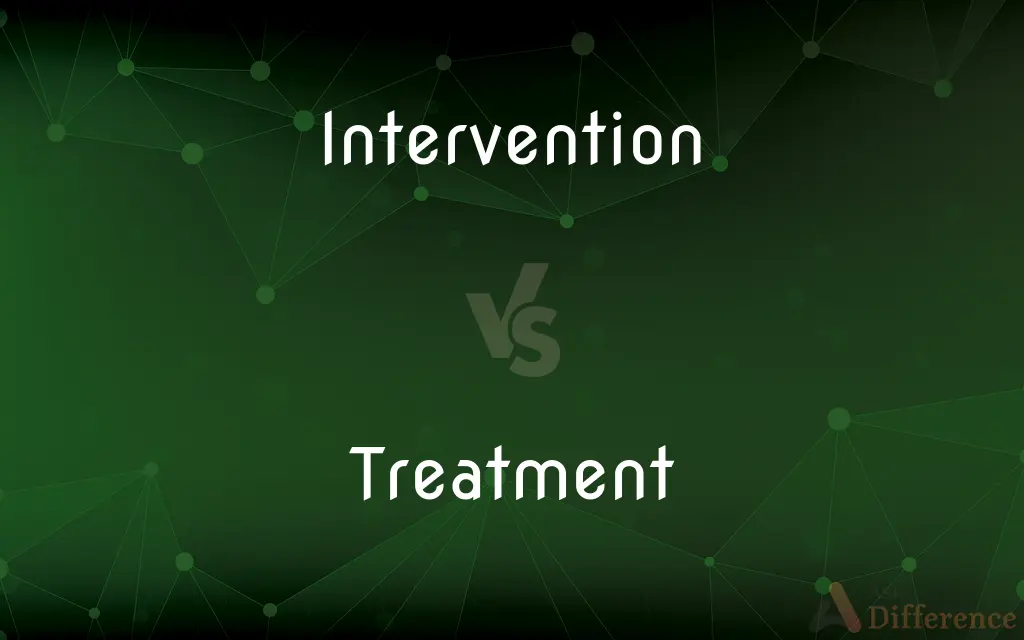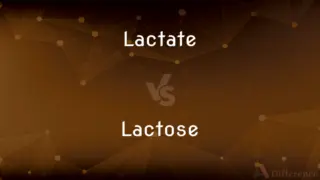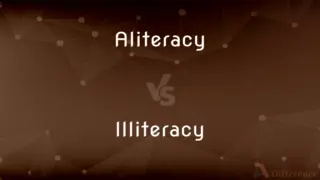Intervention vs. Treatment — What's the Difference?
By Tayyaba Rehman & Maham Liaqat — Updated on February 26, 2024
Intervention often refers to the action taken to improve a situation or condition, focusing on prevention or change, while treatment is the management and care of a patient for the purpose of combating a disease or disorder.

Difference Between Intervention and Treatment
Table of Contents
ADVERTISEMENT
Key Differences
Intervention is a broad term that encompasses a range of actions or strategies designed to bring about change or prevent undesirable outcomes. Treatment, on the other hand, is specifically focused on the medical management of diseases or conditions.
Intervention can be applied in various contexts, including health, education, and social services, aiming at altering situations or behaviors before they escalate. Treatment involves the application of remedies, therapies, and procedures to alleviate symptoms, eradicate diseases, or manage chronic conditions, often after a problem or illness has been diagnosed.
Interventions can be preventive, aiming to stop a problem before it starts, treatments are reactive, addressing existing health issues. For instance, an educational intervention might aim to improve reading skills to prevent future learning difficulties, whereas medical treatment would address the symptoms of dyslexia.
Interventions can also be non-medical, such as policy changes, educational programs, or community projects, focusing on improving societal issues or individual behaviors. Treatments, however, are predominantly within the healthcare realm, requiring professional diagnosis and management.
Both intervention and treatment are crucial for promoting well-being, but their approaches and goals differ. Interventions seek to modify, prevent, or halt the progression of conditions, while treatments are aimed at healing, managing, or curing diagnosed conditions.
ADVERTISEMENT
Comparison Chart
Focus
Prevention or change
Management and care of a disease or disorder
Context
Health, education, social services
Healthcare
Nature
Can be proactive or reactive
Primarily reactive
Application
Before or during the development of an issue
After a problem or illness has been diagnosed
Examples
Educational programs, community projects
Medications, surgeries, therapies
Compare with Definitions
Intervention
The process of intervening in a process or condition.
Intervention by the teacher helped resolve the conflict between students.
Treatment
The application of remedies to heal or relieve a disease.
Antibiotic treatment is effective against bacterial infections.
Intervention
An action taken to improve a situation, especially in health, education, or social policy.
The school's reading intervention program aims to help struggling students.
Treatment
The act of treating a patient in a medical context.
Her treatment for the injury was successful, leading to a full recovery.
Intervention
A strategic approach to prevent or solve problems.
Government intervention in the housing market was designed to stabilize prices.
Treatment
Therapeutic measures taken to help a person recover from a disease.
Cancer treatment often involves a combination of chemotherapy and radiation.
Intervention
The involvement in a situation to change the outcome.
Early intervention in the child's behavior problems prevented more serious issues later.
Treatment
A specific procedure used to address health issues.
The new treatment for Alzheimer's shows promise in early trials.
Intervention
A method or procedure used to prevent a condition from progressing.
Nutritional intervention can play a key role in preventing obesity.
Treatment
The management and care of a patient for the purpose of combating a disease or disorder.
The treatment for his condition includes medication and physical therapy.
Intervention
The act or process of intervening
A nation's military interventions in neighboring countries.
A politician opposed to government intervention in the market economy.
Treatment
The process or manner of treating someone or something.
He still has nightmares resulting from the treatment he received from his captors.
Intervention
The systematic process of assessment and planning employed to remediate or prevent a social, educational, or developmental problem
Early intervention for at-risk toddlers.
Treatment
Medical care for an illness or injury.
A treatment or cure is applied after a medical problem has already started.
Cancer survivors who got radiation treatments as children have nearly twice the risk of developing diabetes as adults.
The change is due largely to the increased availability of antiretroviral treatment.
Intervention
The action of intervening; interfering in some course of events.
Treatment
The act or manner of treating; management; manipulation; handling; usage; as, unkind treatment; medical treatment.
Intervention
The act of intervening; interposition.
Sound is shut out by the intervention of that lax membrane.
Treatment
Entertainment; treat.
Accept such treatment as a swain affords.
Treatment
Care by procedures or applications that are intended to relieve illness or injury
Common Curiosities
Can intervention and treatment be used interchangeably?
No, because intervention often refers to preventative measures or actions taken to change a situation, while treatment specifically refers to medical care provided after a diagnosis.
What is the main difference between intervention and treatment?
Intervention focuses on prevention or change, often before a problem fully develops, while treatment deals with the management of a disease or disorder after diagnosis.
What is the goal of an intervention?
The goal is to prevent, alter, or halt the progression of a condition or situation.
Are interventions only for individuals?
No, interventions can target individuals, groups, or entire communities.
What does treatment usually involve?
Treatment typically involves medications, surgeries, or therapies to combat diseases or manage conditions.
What is the goal of treatment?
The goal is to heal, manage, or cure a disease or medical condition.
What are examples of interventions?
Educational programs, community projects, and policy changes are examples of interventions.
Is intervention always medical?
No, interventions can be educational, social, or policy-related, in addition to medical.
Can someone receive treatment without an intervention?
Yes, treatment typically follows the diagnosis of a condition, whether or not an intervention took place beforehand.
How is treatment decided?
Treatment decisions are based on medical diagnoses, patient conditions, and the best available evidence for efficacy.
Are there ethical considerations in treatment?
Yes, ethical considerations in treatment include patient consent, the potential benefits versus risks, and the equitable distribution of healthcare resources.
Can interventions be harmful?
If not properly designed or implemented, interventions can have unintended negative effects, though they are generally intended to be beneficial.
How do professionals decide on an intervention?
Decisions are based on assessments of potential or existing issues, with the aim of choosing the most effective strategy to prevent or alter the situation.
Can treatments be part of interventions?
Yes, treatments can be components of broader intervention strategies, especially in healthcare settings.
What is the role of research in intervention and treatment?
Research plays a crucial role in developing, testing, and refining interventions and treatments to ensure they are effective and safe.
Share Your Discovery

Previous Comparison
Lactate vs. Lactose
Next Comparison
Aliteracy vs. IlliteracyAuthor Spotlight
Written by
Tayyaba RehmanTayyaba Rehman is a distinguished writer, currently serving as a primary contributor to askdifference.com. As a researcher in semantics and etymology, Tayyaba's passion for the complexity of languages and their distinctions has found a perfect home on the platform. Tayyaba delves into the intricacies of language, distinguishing between commonly confused words and phrases, thereby providing clarity for readers worldwide.
Co-written by
Maham Liaqat















































